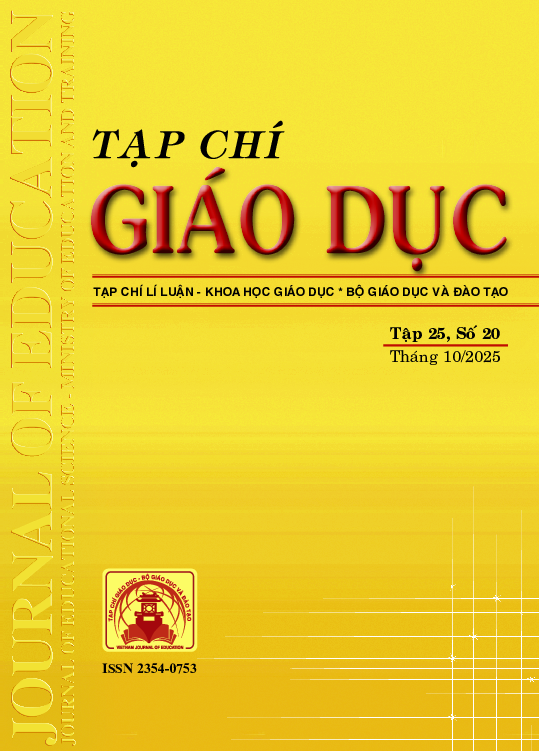Thực trạng kĩ năng mềm của học sinh trung học phổ thông tại Thành phố Hồ Chí Minh
Tóm tắt
In the context of competency-based general education innovation, soft skills have been considered a core element in the formation of students' comprehensive competencies. This study aims to assess the current status of soft skills of high school students in Ho Chi Minh City through a survey questionnaire. The sample after data cleaning involves 264 high school students. It is shown that students' soft skills are mainly at a fair level; the global integration skills group has the highest average score, while the adaptation and responsibility group the lowest. At the same time, there is a statistically significant difference by gender in the adaptation and responsibility group, when male students' self-assessed result was higher than that of female students. The research results suggest the need to organize soft skills education activities for students in the direction of inter-group integration, creating a premise for students to integrate and study at a higher level.
Tài liệu tham khảo
Anderson, R. (2004). Gender and computers: Understanding the digital divide. Journal of Marriage and the Family, 66(3), 542-543. https://journals.sagepub.com/doi/10.2190/EC.49.1.e
Artawijaya, L., & Supratiwi, M. (2024). Cognitive flexibility and resilience in adolescents: Exploring gender differences and cultural implications. Nusantara Journal of Behavioral and Social Science, 3, 151-160. https://ukinstitute.org/journals/4/njbss/article/view/62
Bao, Y., Xiong, T., Hu, Z., & Kibelloh, M. (2013). Exploring gender differences on general and specific computer self-efficacy in mobile learning adoption. Journal of Educational Computing Research, 49(1), 111-132. https://journals.sagepub.com/doi/10.2190/EC.49.1.e
Battelle for Kids (2019). P21 framework for 21st century learning [PDF brief]. https://www.battelleforkids.org/wp-content/uploads/2023/11/P21_Framework_Brief.pdf
Bộ GD-ĐT (2018). Chương trình giáo dục phổ thông - Chương trình tổng thể (ban hành kèm theo Thông tư số 32/2018/TT-BGDĐT ngày 26/12/2018 của Bộ trưởng Bộ GD-ĐT).
Campbell-Sills, L., Forde, D. R., & Stein, M. B. (2009). Demographic and childhood environmental predictors of resilience in a community sample. Journal of Psychiatric Research, 43(12), 1007-1012. https://doi.org/10.1016/j.jpsychires.2009.01.013
CASEL (2020). CASEL’s SEL framework: What are the core competence areas and where are they promoted? https://casel.org/casel-sel-framework-11-2020/
Cornblath, E. J., Ashourvan, A., Kim, J. Z., Betzel, R. F., Ciric, R., Adebimpe, A., … Bassett, D. S. (2020). Temporal sequences of brain activity at rest are constrained by white matter structure and modulated by cognitive demands. Communications Biology, 3(1), 261. https://doi.org/10.1038/s42003-020-0961-x
Durlak, J. A., Weissberg, R. P., Dymnicki, A. B., Taylor, R. D., & Schellinger, K. B. (2011). The impact of enhancing students’ social and emotional learning: A meta-analysis of school-based universal interventions. Child Development, 82(1), 405-432. https://doi.org/10.1111/j.1467-8624.2010.01564.x
Goleman, D. (1995). Emotional intelligence: Why it can matter more than IQ. Bantam Books.
Hair, J. F., Black, W. C., Babin, B. J., & Anderson, R. E. (2010). Multivariate data analysis (7th ed.). Pearson.
Hoàng Hòa Bình (2015). Năng lực và đánh giá theo năng lực. Tạp chí Khoa học, Trường Đại học Sư phạm Thành phố Hồ Chí Minh, 71, 21-32.
Huỳnh Văn Sơn, Mai Mỹ Hạnh, Nguyễn Thị Mỹ Hạnh, Nguyễn Thanh Huân, Lâm Thị Kim Liên, Đỗ Tất Thiên, Giang Thiên Vũ (2020). Giáo dục kĩ năng mềm và tư vấn tâm lí cho học sinh trung học. NXB Giáo dục Việt Nam.
McClelland, D. C. (1973). Testing for competence rather than for “intelligence.” American Psychologist, 28(1), 1-14. https://doi.org/10.1037/h0034092
Nealy, C. (2005). Integrating soft skills through active learning in the management classroom. Journal of College Teaching & Learning, 2(4), 1-6. https://doi.org/10.19030/tlc.v2i4.1830
Nunnally, J. C., & Bernstein, I. H. (1994). Psychometric theory (3rd ed.). McGraw-Hill Education.
OECD (2018). Preparing our youth for an inclusive and sustainable world: The OECD PISA global competence framework. OECD Publishing.
Robles, M. M. (2012). Executive perceptions of the top 10 soft skills needed in today’s workplace. Business Communication Quarterly, 75(4), 453-465. https://doi.org/10.1177/1080569912460400
UNESCO (2013). Global citizenship education: An emerging perspective. UNESCO Publishing. https://unesdoc.unesco.org/ark:/48223/pf0000224115
Zins, J. E., Weissberg, R. P., Wang, M. C., & Walberg, H. J. (Eds.). (2004). Building academic success on social and emotional learning: What does the research say? Teachers College Press.
Tải xuống
Đã Xuất bản
Cách trích dẫn
Số
Chuyên mục
Giấy phép

Tác phẩm này được cấp phép theo Ghi nhận tác giả của Creative Commons Giấy phép quốc tế 4.0 .












